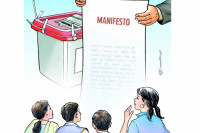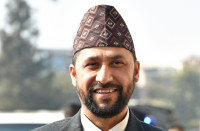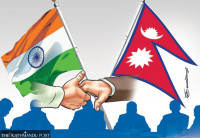National
At House dissolution hearing, advocates prod bench to look to legislative intent
Stating that the constitution does not provide any room to the prime minister to dissolve the Parliament, advocates demand recordings of the charter drafting process.
Binod Ghimire
A month after President Bidya Devi Bhandari dissolved the House of Representatives on the recommendation of Prime Minister KP Sharma Oli, the Supreme Court has finally started hearing on the core content of the writ petitions against the move.
Though the hearing began on December 23 on as many as 13 petitions that have challenged the House dissolution, arguing that the move is extra-constitutional, the focus had been on the composition—whether the Constitutional Bench should hear the writs or they should be sent to an extended full bench.
It was only on Friday that the Constitutional Bench of the Supreme Court decided to continue hearing the petitions as “they fall under its jurisdiction” as the case warranted serious constitutional interpretation. The Constitutional Bench had also announced that it would hear the case “continuously” starting Sunday.
“The Constitutional Bench has now got into the core content,” Kishor Poudel, a communication expert at the Supreme Court, told the Post. “The hearing will continue on Monday as well.”
The Constitutional Bench, otherwise, heard cases twice a week—on Wednesday and Friday.
The Constitutional Bench has decided to conduct the hearing throughout the week, given the gravity of the matter.
On Sunday, senior advocates Bhimarjun Acharya, Dinesh Tripathi, Sunil Pokharel and advocates Santosh Bhandari and Badri Raj Pandey among others pleaded on behalf of the petitioners, arguing that the Oli government’s move of dissolving the lower house was unconstitutional.
The Oli government cited Articles 76 (1), 76 (7) and 85 while recommending that the President dissolve the House.
Article 85 (1) states that unless dissolved earlier pursuant to this constitution, the term of the House of Representatives shall be five years.
Articles 76 (1) and 76 (7) talk about formation of the government.
The lawyers said that the constitution deliberately incorporated the provisions barring the prime minister from dissolving the House.
Tripathi said the court should demand recordings of the constitution drafting process to understand the legislative intent of the discussions which focused on why a prime minister should not be given the carte blanche to dissolve the House.
In response, Chief Justice Cholendra Shumsher Rana, who is leading the bench, said a similar demand has been made earlier as well and that the court can take it into consideration.
“We have taken note of it,” he said. “We will seek the recordings if necessary.”
Acharya said that the House of Representatives expires only on two conditions: first, when it expires by effluxion of five years time from its first meeting, and second, when there is no possibility of forming a government.
“The prime minister doesn’t have the authority to dissolve the House of Representatives,” Acharya argued.
“Isn’t it the prime minister who dissolves the House as per Article 76 (7)?” questioned Chief Justice Rana.
Acharya then argued that it is the House which makes the announcement that there is no possibility of formation of the government—not the prime minister.
All the advocates had a unanimous voice that the House of Representatives became the victim of the dispute within the Nepal Communist Party.
Oli himself has on several occasions defended his House dissolution move, saying his opponents in his party, namely Pushpa Kamal Dahal and Madhav Kumar Nepal among others, “created hurdles” in his work, thereby prompting him to make a decision of seeking a fresh mandate from the people.
As a result of his House dissolution move, the Nepal Communist Party has split, practically, and the other faction is led by Dahal and Nepal. The party, however, has yet to split legally, and both factions have staked their claims to the Nepal Communist Party.
Pokharel argued that Oli decided to dissolve the House without even making attempts to prove his majority.
“Other parties could have voted for Oli had he faced a no-confidence motion,” said Pokharel. “He was facing problems within his party, but the House became the victim.”
He also questioned Oli’s arguments that the House didn’t allow him to perform freely. He argued that Oli had failed to provide any evidence as to what problems he faced from the House in performing his duties as the executive head.
Pokhrel also took a dig at Oli saying the House instead was his fan as he had received applause at the same House when he claimed that turmeric and hot water could defeat the coronavirus.
“Oli has made political statements but he has failed to provide any constitutional grounds and concrete reasoning for his action,” Pokhrel argued before the bench.
Lawyers pleading on behalf of the petitioners will put forth their arguments on Monday as well.




 11.12°C Kathmandu
11.12°C Kathmandu















